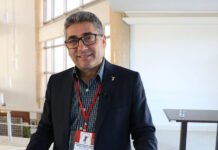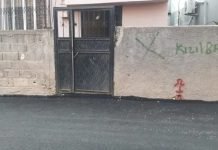Thirty-two years after 33 intellectuals and artists were killed in an arson attack on a hotel in Turkey’s Sivas province, the search for justice continues for Turkey’s Alevi community and other victims of the attack, Deutsche Welle (DW) Turkish service reported.
On July 2, 1993, a mob set fire to the Madımak Hotel in Sivas, where a group of prominent writers, poets and intellectuals, mostly from Turkey’s Alevi community, had gathered for a cultural festival. In addition to the 33 victims, two hotel workers and two protestors were also killed in the fire.
Widely known as the Madımak Massacre, the attack became a powerful symbol of the deep-rooted prejudice and hate faced by the Alevi community in Turkey, where Alevis today comprise an estimated 20 percent of the 85-million-strong population.
Security forces were present in front of the hotel, but they mostly remained passive, and firefighters were late to intervene. Refusing to acknowledge the scope of the massacre and its anti-Alevi dimension, the local authorities and government of the time instead portrayed the incident as an attack on left-wing intellectual Aziz Nesin, whom they accused of provoking the people with his attacks on religion and who was in the hotel at the time of the fire.
Although nearly 12,000 people were part of the mob, only 124 were arrested in connection to the arson, with 33 initially sentenced to death. However, the capital punishment convictions were overturned by the Supreme Court of Appeals in 1998, and many perpetrators were either released during the judicial proceedings or granted a pardon. In 2012 the statute of limitations was used to drop the case, despite the objections of the Alevi community and rights defenders.
In 2015 a report published by the presidency’s State Audit Board (DDK) acknowledged “serious negligence and failures” on the part of the state authorities. While victims’ families and NGOs called for turning the Madımak Hotel into a site of conscience, the building was expropriated by the government and became a science museum in November 2010.
Over the years, it emerged that several fugitive suspects had continued their lives without disruption, some serving in the military, others holding jobs in public entities such as municipalities.
Moreover, in 2023 President Recep Tayyip Erdoğan granted clemency to two individuals convicted in the massacre, Hayrettin Gül and Ahmet Turan Kılıç.
Şengül Hablemitoğlu, a psychologist and the widow of historian Necip Hablemitoğlu, who was assassinated in front of their home in 2002, said the massacre was one of many incidents that had not been resolved.
“I was a young mother when Madımak was set on fire. My children were just one and two years old. It was the early 1990s. I can never forget the horror and shock I felt on July 2, 1993. In Turkey, there isn’t a single day untouched by anguish. This country is always burning, sometimes with its forests, sometimes with its people, its animals. This country is a site of fire. And amid all these fires, lives are wasted. And on top of it, justice not being served, the criminals are being pardoned, some of them escaping, being protected… It’s all so familiar. It’s happened right before our eyes, time and again. It’s still happening. The grief of those left behind is still fresh, lifelong, quietly aching sorrows.”
Alevis have historically been the largest religious minority group in Turkey. Incorporating Shiite, Sufi, Sunni and local traditions, Alevism is a strain of Islam that emerged in the Middle Ages.
Turkey has long denied the demands of Alevis for state recognition, and cemevis —houses of worship and places for community gatherings for the followers of Alevism — are not officially recognized by the state.
Moreover, hate crimes against Alevi communities are common. Cemevis have occasionally been vandalized, with foul language and insults put on their walls.
The community has been under increasing political pressure and subjected to discrimination under the rule of the Justice and Development Party (AKP), which has been in power since 2002.













